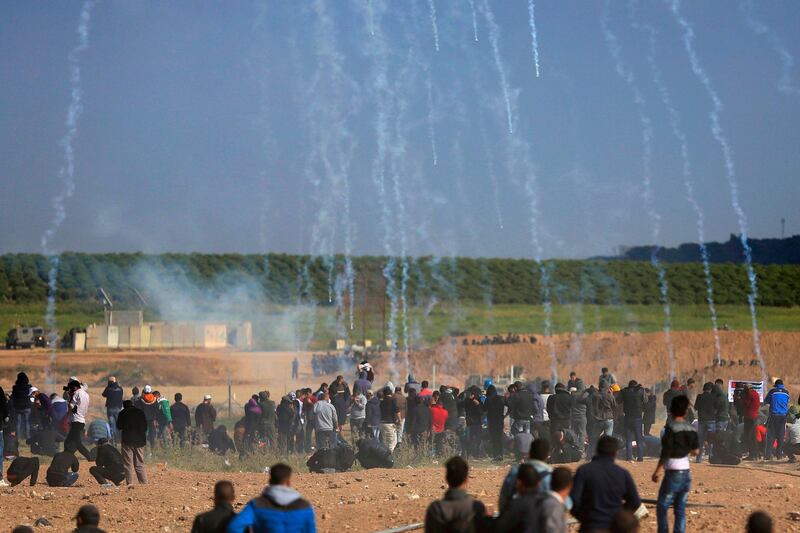When an entire people and many of their political leaders conclude they have nothing left to lose, all hell can break loose. Such despair and desperation was on full display in Gaza yesterday when thousands of Palestinians protested at the border with Israel and at least 16 demonstrators were killed by Israeli troops. In the coming weeks it's going to be extremely difficult to contain the fallout and prevent violence spiraling out of control.
The Palestinian people, especially in Gaza, are at their wit's end. Land day, commemorating the massive dispossession of Palestinian-owned property by the Israeli state in its earliest years, is always emotive. This year, grassroots organisers in Gaza called for major protests at the border. And when this call was championed by Hamas and other political groups, it became a major flashpoint.
Gaza has probably never seen a demonstration of this size, including whole families, with many women and children. All reports suggest a surreal atmosphere, with vendors selling ice cream to picnicking families while, not far off, groups of young men were risking their lives to challenge the border that separates most Gazans from their ancestral lands in what is now southern Israel.
It's no surprise ordinary Gazans feel there’s nothing left to lose. The vast majority are refugees, but live unusually close to their home villages, so near and yet so inaccessible.
Life in Gaza has become increasingly desperate in recent years, with mass unemployment and poverty, rampant hunger, undrinkable water, a sewage crisis that has rendered the coastline a dumping ground for human waste, wretched healthcare, and no practical way in or out of what has become, in effect, a densely packed prison.
Moreover, for more than 10 years they've had to endure the misrule of Hamas, the heavily armed Muslim Brotherhood faction that exploits and exacerbates their misery.
But Hamas, too, doesn't seem to feel there's much to lose. This summer, the group tried to get out of a strategic stranglehold without relinquishing their grip on Gaza. But the noose has only been tightened by Israel and Egypt.
Hamas had been counting on political "reconciliation" with Fatah and the Palestinian Authority to relieve them of the burden of administering Gaza and caring for its people, finally securing essential aid and reconstruction from the international community, and regaining themselves a foothold back in the West Bank. However, Palestinian president Mahmoud Abbas conditioned reconciliation on Hamas disarming, which the militant group wouldn't consider. So, Hamas is out of options.
But Mr Abbas is also throwing caution to the wind. After being spurned by Israel, and the devastating rebuke of Washington abandoning a two-state outcome and declaring Jerusalem to be Israel's capital, his strategy of diplomacy and negotiations looks like the ultimate failure and folly. The last straw was Hamas's assassination attempt against his prime minister, Rami Hamdallah, in March.
Mr Abbas lashed out at all of them in wild and infuriated speeches. He denounced Israel and the Jewish narrative. He lambasted the Trump administration's alleged peace plan as an outrageous "slap of the century" and called US ambassador David Friedman a "son of a dog". And he excoriated Hamas as "thugs and hooligans," and pledged major new sanctions on Gaza to punish them, and, implicitly, make life difficult for Israel and Washington as well. Those speeches screamed "nothing left to lose."
Mr Abbas has obviously been nudging Hamas and Israel towards another conflict, hoping to emerge as the beneficiary while his two adversaries savage each other and Washington tries to clean up the mess. Since last summer, most have assumed that neither Hamas nor Israel wants another conflict. That's probably no longer correct, since large parts of Hamas's leadership probably not only now want, but need, another conflict with Israel as the only way out of an absolutely impossible trap.
Having lost most of the aid they were getting from Qatar, Hamas, particularly its more militant wings, have been drifting much closer to Iran again in recent months. Tehran is no doubt delighted at the unfolding turmoil.
Yet these "nothing left to lose" strategies are highly risky.
Mr Abbas is already scrambling not to be outbid on nationalism, protests and commemorations by Hamas and Gaza activists. And the unrest could easily spread to the West Bank, where it will immediately become his problem.
As for Hamas, the political impact of another catastrophic conflict with Israel is impossible to predict. It could propel them to national power, but could just as easily be the final blow to their credibility, even in Gaza.
The next six weeks are a nightmare for deescalation prospects. A series of protests have already been scheduled throughout that timeframe, with highly clustered flashpoints such as Nakba Day on May 15, commemorations of the 70th anniversary of Israel's founding on May 14-15, and the planned opening of a US embassy in Jerusalem on May 14.
If there isn’t a major escalation of violence – especially with Palestinian leaders in utter desperation playing with fire and Israel immediately resorting to deadly force against unarmed demonstrators – it will be a political miracle. But the “holy land” rarely delivers such miracles.





